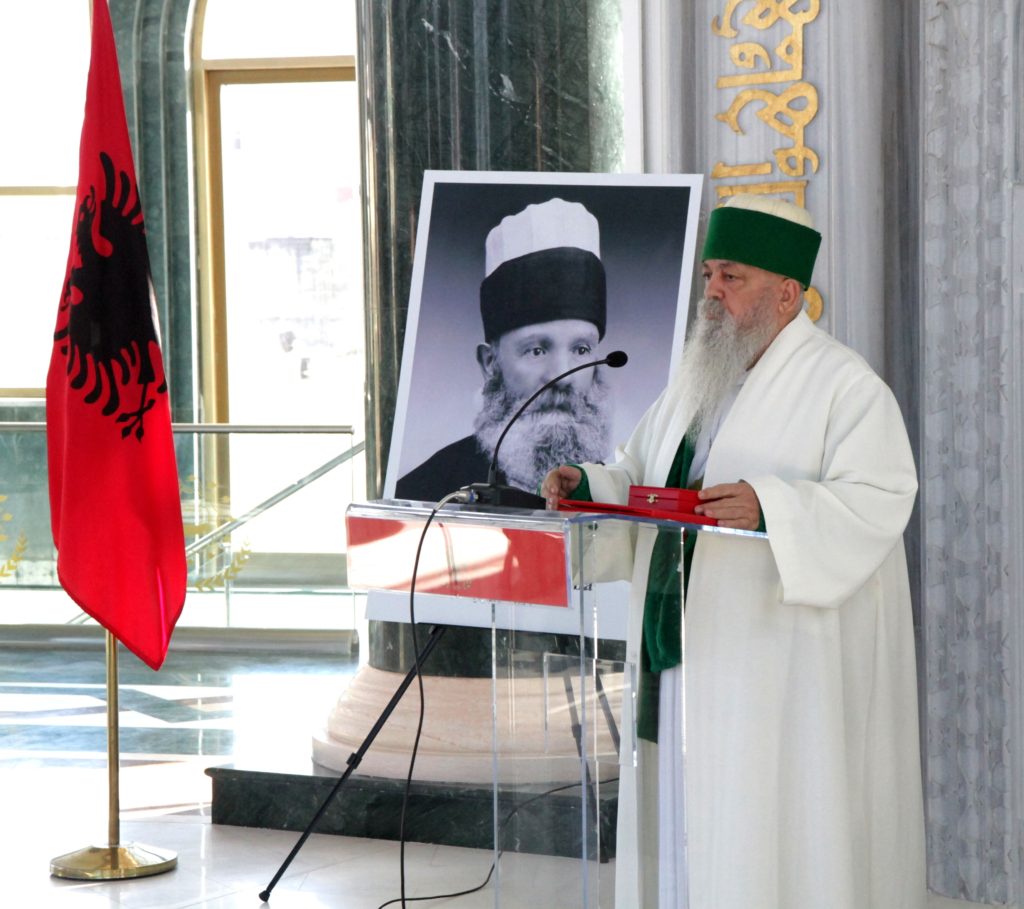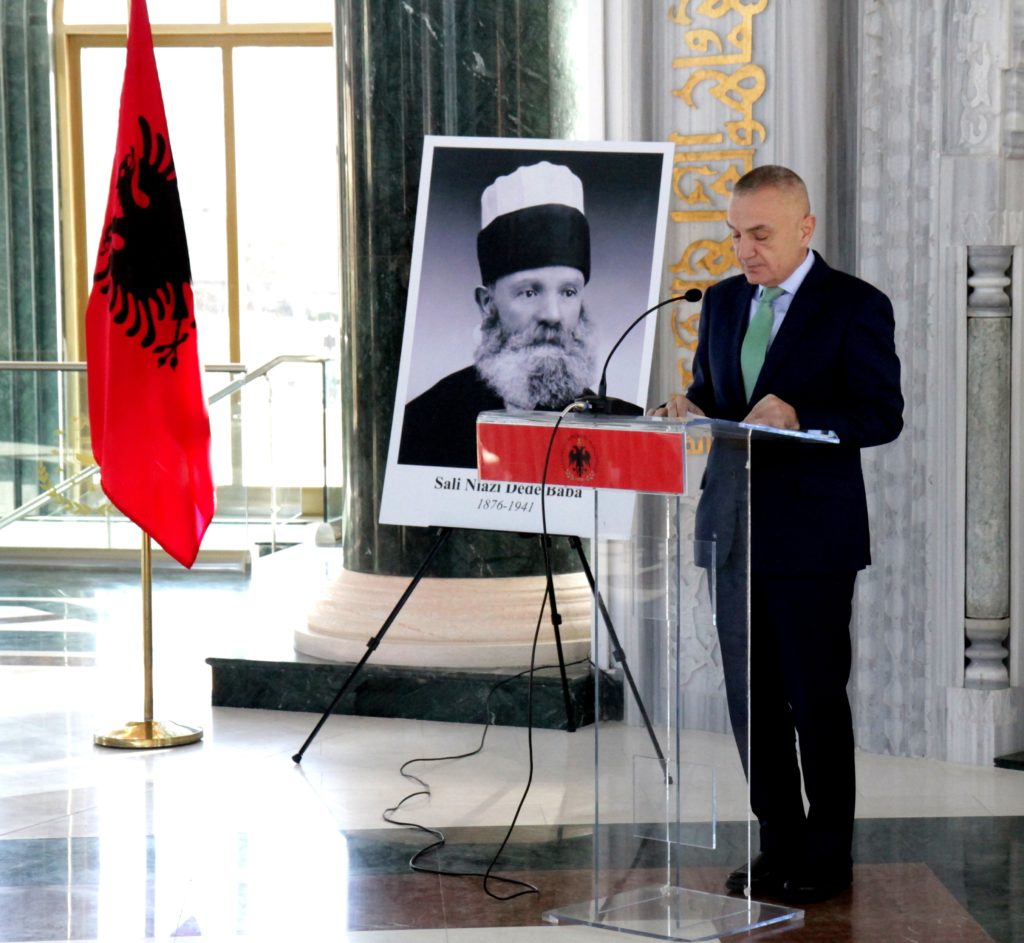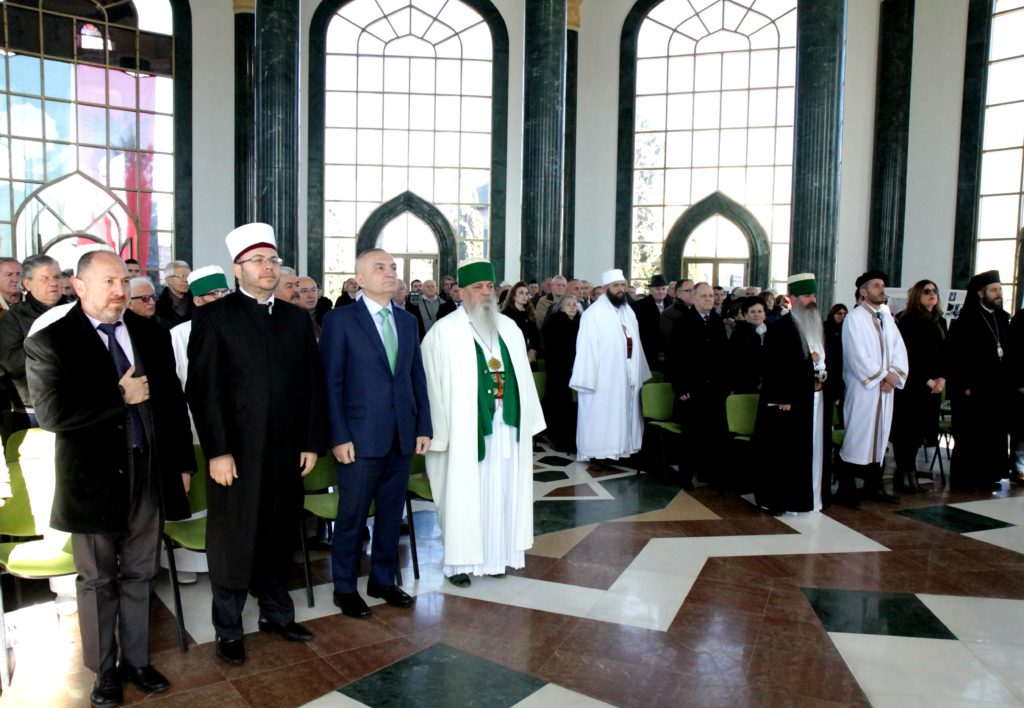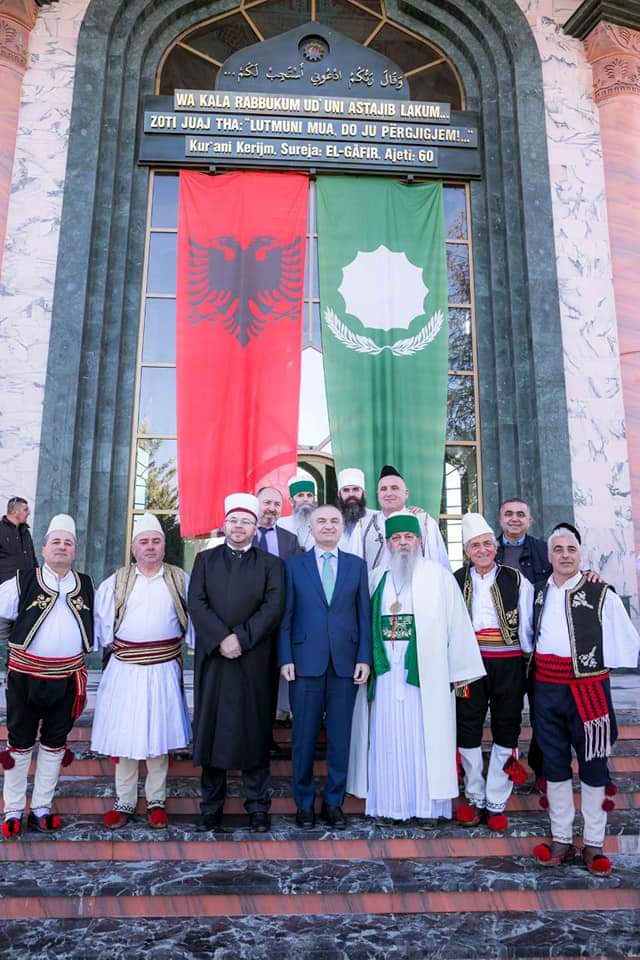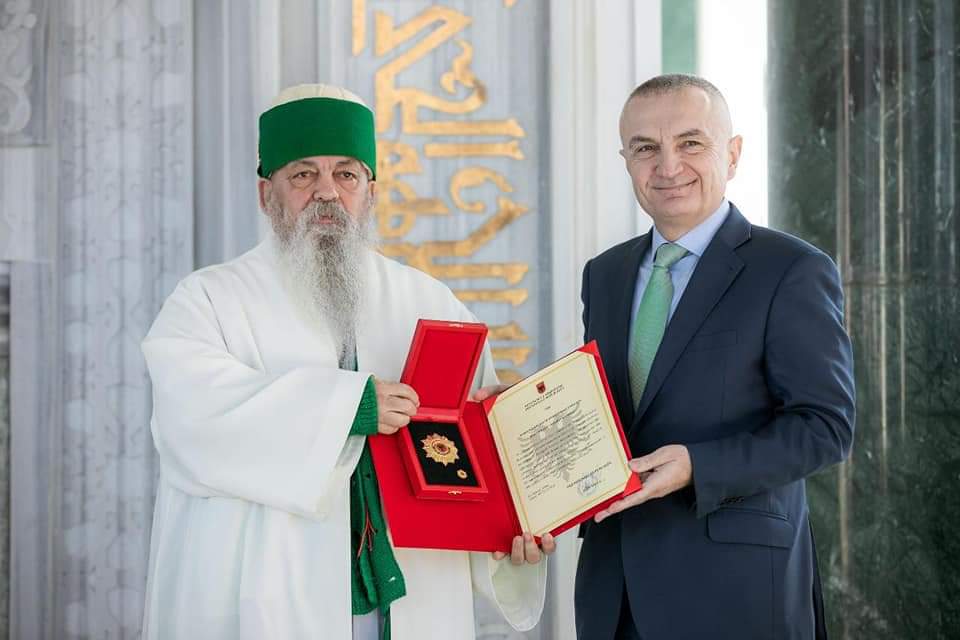
The President of the Republic, H.E.Mr. Ilir Meta praised today in a solemn ceremony held at the Bektashi World Headquarters, attended by the World Grandfather, His Grace Haxhi Dede Edmond Brahimaj, many leaders and believers of the Bektashi community, the patriot and prominent religious personality) with the high decoration "Honor of the Nation".
Sali Niazi Dede, was born in Starje of Kolonjë on March 5, 1876, a time in which (surpassing the 19th and 20th centuries), Bektashism in Albania had come to a great development. Moreover, not only in the Albanian territories, but also in other Balkan countries, around us, the Bektashi doctrine was spreading more and more. This is due to the adaptation of this belief to the Balkan reality, as well as to the tolerant spirit it conveyed. It is thought that this was one of the reasons that Bektashism, especially in the south of Albania, gained more and more new spiritual terrains every day. It was precisely the influence of the famous tekkes of Qesaraka, Starje, but also those of Leskovik and Kreshova, that left deep traces in the childhood of Sali Niazi. With the pure and real image of this Bektashism, Sali Niazi, found himself at the age of 8 in Istanbul with his family, in search of a better life. At the age of 13, he attended classes in Istanbul and Haxhi Bektash, along with hundreds of other students from Anatolia, Asia to Iran and Iraq. Thanks to that Albanian spiritual heritage, in 1897, he decided to enter the path full of Bektashi kindness.
At this time, he is in the attention of the former Grandfather of the time, Haxhi Fejzi Dedeit, who was originally from the village of Maricaj in Tepelena. After surrendering as a dervish in the path of Haqq, he embraces not only the teachings of the Qur’an, the hadiths of the Prophet Muhammad, but also the keys of mystical knowledge. He is convinced that a complete harmony between studies, rituals and departures from everything of this mortal world, could lead him to the perfect model of the Bektashi cleric. In 1908, Dede Fejziu charged Salih Niazi with the task of reconciling the great grandfather with the Çelebi family. With this task entrusted was realized how unifying, reconciling and problem solving he was. The ingenuity, foresight, connection with the right and the truth that characterized him in every moment, were massively noticed and appreciated. Two decades of rich spiritual life, as well as endless worship of the Creator, paid off. With the departure from this life of the former Bektashi Grandfather, Haxhi Fejzi Dedei, the high paternal council appoints Sali Niazi to the high post of leader of this faith. This was an honor not only for Sali Niazi, but for all Albanians. On this occasion, we showed the whole Bektashi world that we did not only keep this faith pure, but we also had special educational values through which people with such spiritual traits were born and raised. With his appointment in 1913, to this high post, Salih Niazi Dede, continued safely and quite purely, the journey started by the Bektashi dervishes and fathers. According to numerous Ottoman documents, the good name of the Albanian Salih Niazi, had crossed the borders of the empire in time. Thanks to various reforms and instructions to maintain Bektashi spiritual purity, the name of Salih Niazi Dedeit was revered among the millions of believers in Egypt, Syria, Iran, Iraq, Azerbaijan, Turkmenistan, Greece, Romania, Bulgaria, Yugoslavia and even Asia.
On December 17, 1919, Mustafa Kemal Ataturk, who visited the tekke of Haxhi Bektashi, received the moral and material support of Salih Njazi Baba and Xhemaladin Çelebi for the liberation war. Salih Njazi Dedei became so influential with his efforts in the independence of the Turkish nation, as it was for the prosperity of his people.
When the Turkish parliament, by a special decision, in December 1925, ordered the closure of all tekkes in the Ottoman Empire, Salih Niazi Dedei turned a blind eye to his homeland, Albania. Of course, he knew very well that Bektashism in the Albanian territories had born and raised for centuries, so the transfer of the world center of this faith there, would be seen as a white omen for Albania.
There are several correspondences between him and the Kingdom of Albania in 1929, which highlight not only the desire of this cleric to finally settle in Albania, but also the guarantees without any interest of King Zog, for the necessary help. This undoubtedly led Sali Niazi Dede, after consulting the ancestral councils in different countries, to make the decision to move the Bektashi world center from Turkey to Tirana. This major act, to this day, stands full of emotion among the various solutions of the Albanians, throughout its history. He left Ankara in January 1930 and arrived in Albania, in the Turan-Korça tekke on January 28, 1930, according to the decision of the Third Bektashi Congress held in the Turan-Korça tekke. Here, he carried out an extensive activity for the further advancement of Bektashism in Albania, the Balkans and in the world.
Sali Niazi Dede, came to Albania with the clear idea of increasing the Bektashi faith, precisely in the southwest of Christian Europe. As soon as he set foot on Albanian soil, the prominent Bektashi cleric, in addition to the traditional spirit of the Bektashi faith, also tried that of other believers and ordinary people. All the patriotic activity of the Bektashis in the twenties of the last century, had the full support of the Albanian state and King Zog. The decree of His Grace, Sali Njazi Dedei, as the World Leader of Bektashism was made in March 1930.
For 11 years in a row, Sali Niazi Dede, was put in charge of the difficult work for the best possible organization of our faith, especially in the Albanian lands. But his care was felt far and wide, in Bektashi tekkes in Greece, Bulgaria, Romania, Macedonia, Serbia, Kosovo and Montenegro. He was in the midst of all the Bektashi dynamics in the Balkans and with his advice, messages and orders, tried at all costs to preserve the values of this faith, even though the world was heading towards a new world war. The heart of every believer had to beat with the great love of the homeland. Seeing with what religious and intellectual care, but also with what spiritual love the Bektashi congresses and statutes were prepared, this devout cleric was the first in the concrete implementation of the Bektashi customary codes. There are dozens of fathers who left their tekkes and for weeks, went to Tirana, receiving not only religious lessons from their high myrshid, but wanting to follow him, in emblematic wisdom and simplicity. The irreplaceable role of this clergyman is also in terms of preserving tradition within the faith. But this tradition, Salih Niazi Dede, saw in full accordance with the time that passed. Independence in ideas and actions, education of patriotism, natural resentment towards the occupier, have undoubtedly led to the resurrection of blind powers against Salih Niazi Dedei. There are some Albanian fathers who have shown that in these conditions, many of them came to Tirana, surrounded by their benefactors, just to be physically close to this cleric who was approaching 70 years of age. But the Grandfather had understood and escorted them to the tekke and, sitting in the presence of two faithful dervishes. Of course he lived with the wild reality. The murderous hand that shot at Salih Niazi Deden on November 28, 1941, thought he would frighten the entire army of Bektashi clerics. In fact the opposite happened. Salih Njazi Dedej was martyred for carrying out his sacred mission.
The Central Status Commission “Martyr of the Fatherland” has declared Sali Njazi Dede “Martyr of the Fatherland”, with Decision No. 218, dated 23.04.2010. Also, the Bektashi World Headquarters has been declared a “Cultural Monument” by the Ministry of Tourism, Culture, Youth and Sports with Order no. 236, dated May,17.2010. Even those clerics who came after him testified to patriotism and spiritual purity, just as much as their myrshid, slaughtered, disagreeing with the invader, with the tyrannies and ideas that were killing human freedom. The Bektashi motto “Without a homeland there is no religion”, has always frightened the enemies of Albania. Salih Niazi Dede has been and remains the inventor and builder of the magnificent building of Bektashism in our country. Albapost, in the cycle of prominent figures for 2001, has named Salih Niazi Dede in the stamp show. He received the title “Martyr of the Fatherland” from the Council of Ministers of Albania and from the Presidency the order “Honor of the Nation”.
Sali Niazi Dede remains the pride of all Albanians who brought the World Bektashi Center to Albania. He has been and remains the model of the clergyman with great knowledge, wisdom and tolerance. He has been and remains the first reformer of this faith in our country, raising Bektashism to high levels of representation in the Balkans and in the world.
